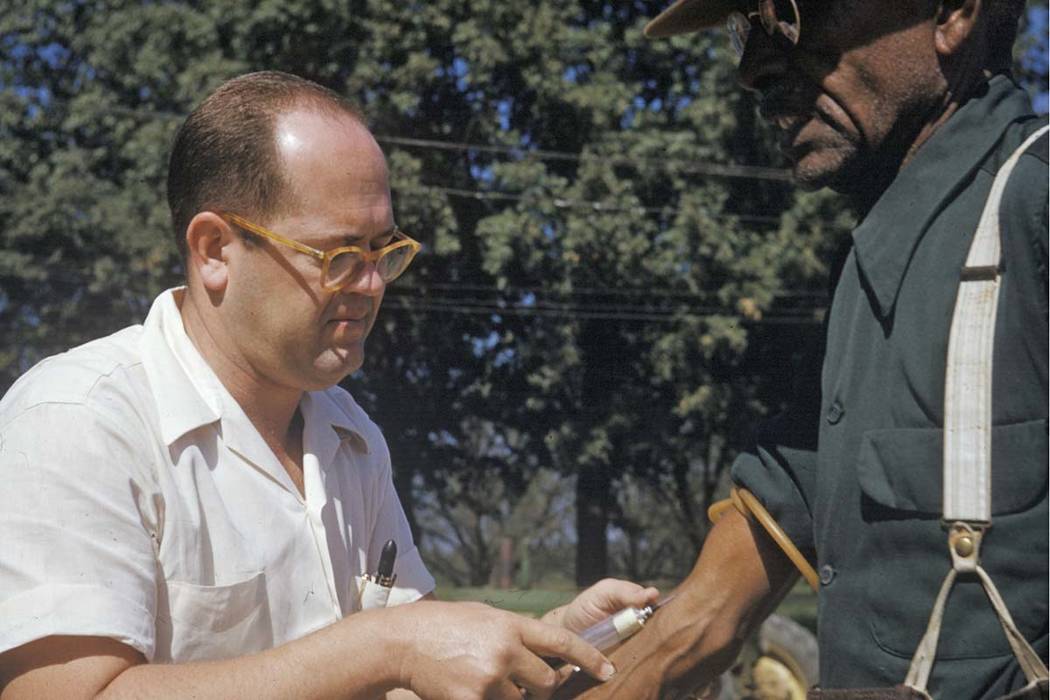Descendants of syphilis study subjects emerging from shadows

TUSKEGEE, Ala. — Decades later, it’s still hard to grasp what the federal government did to hundreds of black men in rural Alabama — even if you’re among their descendants, lighting candles in their memory.
For 40 years starting in 1932, medical workers in the segregated South withheld treatment for unsuspecting men infected with a sexually transmitted disease simply so doctors could track the ravages of the horrid illness and dissect their bodies afterward.
Finally exposed in 1972, the study ended and the men sued, resulting in a $9 million settlement. Twenty years ago this month, President Bill Clinton apologized for the U.S. government. It seemed to mark the end of this ugly episode, once and for all.
Except it didn’t.
Relatives of the men still struggle with the stigma of being linked to the experiment, commonly known today as the “Tuskegee Syphilis Study.” For years they have met privately to share their pain and honor the victims.
And, amazingly, that class-action lawsuit filed by the men in 1973 has outlived them all. The litigation continues to this day, with a federal court currently considering a request that will help determine the study’s final legacy.
Based in one of Alabama’s poorest counties, workers engaged in “The Tuskegee Study of Untreated Syphilis in the Negro Male” initially recruited 600 black men, promising free medical checks and other benefits to many blacks had never even seen a doctor. The men were tested and sorted into groups — 399 with syphilis and another 201 who were not infected.
The disease-free men were used as a control group. Health workers told syphilitic men they had “bad blood.”
None of the men was asked to consent to take part in a medical study. They also weren’t told that “bad blood” actually was a euphemism for syphilis. Doctors never provided them with penicillin after it became the standard treatment for syphilis in the mid-1940s.
It’s doubtful any of the men knew what had happened until an Associated Press story was published nationwide on July 26, 1972.
The next morning, farmer and community leader Charlie Pollard walked into attorney Fred Gray’s office in Tuskegee. Pollard was among the men in the study, and his visit with Gray led to the lawsuit and the multimillion-dollar settlement reached with the government on Aug. 28, 1975. In all, Gray said in an interview, government documents showed 623 men were involved in the study.
Among the participants was Freddie Lee Tyson. Though he displayed no symptoms, Tyson also was born with congenital syphilis inherited from his mother, said his daughter, Lille Tyson Head.
“He was a wise man, very gentle. He was a disciplined man. Active in the church, loved his family and his extended family,” said Head, of Wirtz, Virginia, one of the Tysons’ eight children.
Tyson quit the study during the 1950s after hearing rumblings that “something was wrong,” Lille Head said.
Unaffected by the disease, Tyson learned the true nature of the program only when the rest of the country found out, his daughter said. His wife and children all tested negative for syphilis, but Tyson was traumatized and feared the disease would show up somewhere in his family.
“He was angry and he was upset,” Head said.
Tyson died in 1988 at age 82 after an automobile accident. Today, the 72-year-old Head chairs Voices of our Fathers Legacy Foundation, a nonprofit organization formed in 2014 by the men’s relatives to tell the story of the victims of the Tuskegee study.
Descendants began gathering a year or two after Clinton hosted five remaining test survivors in the White House. The last man involved in the syphilis study died in 2004 and this year, for the first time, relatives both allowed The Associated Press into their annual gathering and invited the public to a ceremony where they lit candles for the men.
This year’s ceremony included about 110 descendants, friends, community members, a gospel choir from Tuskegee University and public officials. There were speeches by Head and attorney Gray and others. The “community day of healing” was a big step for the families, Head said.
For decades, the study has been widely blamed for distrust among U.S. blacks toward the medical community, particularly clinical trials and other tests. In medical and public health circles, it’s known as the “Tuskegee effect.”
The legal fallout from the Tuskegee syphilis study also lives on, at the federal courthouse in Montgomery.
Settlement funds were used for decades to compensate study participants and more than 9,000 of their relatives. Court workers were unable to locate other descendants, and some never responded to letters from the clerk’s office, which disbursed millions before the last payment was recorded in 2008.
Court officials won’t say how much money is left, but documents indicate the balance is mostly interest earnings from money first paid by the government decades ago. Gray said he’s heard it’s less than $100,000.
Some family members say the money should be used for additional funding for medical screenings for the men’s families, and others want a long-discussed memorial at the old hospital where the study was run at Tuskegee University.
U.S. District Judge Myron Thompson is currently considering a request Gray filed in August to use the remaining money to fund operation of the Tuskegee Human and Civil Rights Multicultural Center, a combination museum and town welcome center that includes a display about the syphilis study. The names of the men who were involved in the program are etched in a circle on the floor as a memorial.
A judge refused a similar request from Gray to provide the leftover money to the museum in 2004 after the government insisted it should get the money, records show.